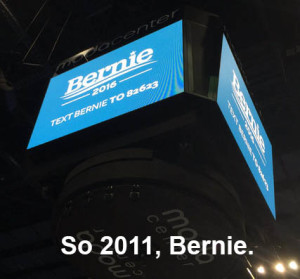Timing is everything — especially in startups.
You need to be pretty durable to be an entrepreneur. It’s said that the best lessons in are often the most painful emotionally and financially. And entrepreneurs get hit by these type of lessons almost daily, sometimes twice.
I awoke this morning to find the New York Times had just the ripped the duct tape off an old, painful wound:
Presidential candidates texting their way to voter connection @nytnickchttp://t.co/XjThXd5xZN
— Michael Tackett (@tackettdc) August 18, 2015
In early 2011, I sunk my life savings to launch PoliMobile. We would bring mobile marketing tools into the world of political campaigns. I didn’t make this decision lightly. I spent six months speaking to politicians, political campaign managers, party officials and others. It was enough due diligence to risk it.
Three years of 70-80 hour weeks, two pivots and some successes followed. I left the decision to the results of a meeting of a 20-something campaign staffer. (I won’t mention the campaign. I respect Al Franken.)
He proved to be a carbon copy of most campaign staffers. He was young, clueless, not curious and somehow arrogant despite this being his second race. He preached that young voters would never connect with campaigns using mobile. His iPhone never left his hands.
Moments later, I happily killed off my startup. I never looked back on those three years until this morning’s tweet, but I learned these lessons.
[br]
#1: Due diligence never ends.
While in development, we checked in the with a group of political advisors. They provided excellent feedback. It helped us create a great platform that solve critical issues.
Unfortunately, I was asking the wrong questions to the wrong people. The BETA of our platform got great reviews. The question I didn’t ask the right people is “what you pay for this?” No campaign wanted to buy it..
The reality is that 90% of all the money campaigns raise goes into media buys. The rest goes for food for the volunteers and minuscule salaries for those who manage them. Outside of the candidate in a few key campaign staffers, the rest tend to be pretty worthless.
Those key campaign staffers got to their positions by following the status quo. They stuck to using outdated campaigns tools: lawn signs, direct mail and broadcast media.
Never quit doing due diligence. You can always pivot sooner than later.
[br]
#2: Customers pay you.
Startups put a lot of weight on building a sizable user base. They invest hordes of funds to get users. And adapt to keep them.
Users don’t matter. Customers do.
Many campaigns signed up for trials. We invest new features based on some of the feedback we received. Unfortunately, most of them never used our platform for one key reason: they never paid for it. No matter how much you give away, most will never use what they won’t buy.
Focus on those who pay. Fuck the rest.
[br]

#3: Timing is everything.
You could do everything perfectly. You could have a few paying customers to validate your work. But if the market is not ready it doesn’t matter.
PoliMobile was ahead of the curve. We launched time when mobile was in heavy use with consumers. Some enterprising campaigns had great success with mobile tools like we offer. Most campaigns today are still not ready for what we offered in 2011.
[br]
I ran into that same campaign staffer later. He was pushing bean water at a second tier coffee chain and didn’t recognize me. I left him an $8 tip on a $2 tea in thanks. He saved me from another few years of pain.

